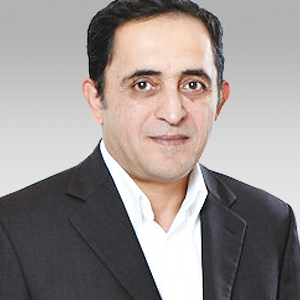“Art and
Humanity”
Afshin Derambakhsh
Project manager
I do not consider myself to be an author, a poet, artist, or public speaker; I am merely an active participant in the field of Arts and try my best to bring cultures and, hence, people together. I believe the purpose of art is to inform the public of those issues upon which certain people reflect less frequently; issues that are rooted in mankind, morality, and different cultural or religious motives.
We know for a fact that “Art” used to be applied in the sense of “technique” and “craft” and that an artist used to be thought of as both a technician and a craftsman. It is such a realization that has elevated human morality. An artist is the first one to criticize his own work and then leave it open to judgment and valid or invalid criticism. In this way, the artist entangles morality and humanity before presenting his work. It is, thereby, fitting to look at two great artists from the perspective of art and mankind: Hafes Shirazi and Günther Uecker.
Hafes is a peerless artist who uses poetics to express himself. He is a multidimensional human, poet, mystic, Quran memorizer, jurisprudent, and litterateur. To know him, one must have had similar spiritual experiences or at least a slight insight into his intellectual disposition. His mysticism is peculiar to himself. One can learn about his glorious mystic soul from his poems; something that removes relevance from fame and mundane titles when applied to him. His mystic art can be fully understood by his words:
“If, below and above (ruined),
the foundation of thy existence be,
Think not in thy heart that,
below and above, thou mayst be;”
Hafes! If in thy head be desire of union (with the true Beloved),It is necessary that the
dust of the court of Him possessed of vision, thou shouldest be Art and mysticism are
closely intertwined and this can be more vividly understood by reading Hafes poems
or looking at the works of Uecker. It is as if Uecker had been accompanied by Hafes
when creating his works. I have known him for years and will describe him as such:
People breathe to live,
Günther Uecker breathes to unveil humanity;
Günther Uecker is not a man of art, poetry, philosophy or even mysticism, but a luminous gateway to the universe, the realities of which can be perceived through this unequalled gateway from a transcendental standing; a place that ascends over the heaven and earth. He has created an eternal literary work of art from an amalgamation of the two. Günther Uecker is, without a doubt, the leading figure of those artists who have managed to touch the eternity through the “Art and Literature” Road. He appears to be the forerunner of geniuses with whose words, the universe, despite its existence and vastness, knowns and unknowns, and desirables and undesirables pales in comparison with. These are the chosen ones; those who to say for whom the Earth revolves and the Sun shines would not be lavish praise. We are speaking of unrivaled pioneers who do not simply listen to the universe, but the universe speaks through them; those who do not merely put feet on the ground, but are the earth›s feet in leading the Caravan of the “earthly” to heavens. With the kind of art they create at their finger, the passion they express by their lip, and the light they carry within their heart, they are doubtlessly God›s embodiments in human form. The line of thinking that sprang into life by Günther Uecker and was passed to great souls and truth-seeking arts from century to century has blossomed via a form of art:
“The mankind is the path of God”. This eternal, everlasting path that cannot be done away with.
Inherent in these cogent and raging thoughts, indeed, flow rivers of roaring lives whose paths consist of minds and hearts. In moving along the life›s abode, it revives the soul, for therein flows the “water of life”. It is no surprise that we think of the residents along this river as life-giving beings and awake awakenings who are on their way towards a pinnacle whose residents observe the supernatural within the natural world and view the universe move from eternity to the beginning and not the other way around.
Art and humanity, the speakers and listeners of life and truth, are true narrators of Uecker›s reality. Through arts, he has managed to penetrate into thoughts, songs, and sorrows; and from pen to papers, notebooks and books, transmitting the message of elegance and radiance to all hearts. This is a spiritual message that deviates from mysticism or philosophy in that it stems from the fabric of life: “submitting to realities which one is not capable of obliterating them even if one manages to deny them”. This message is intended to pave the way for the heaven to touch the earth and for the earth to rush towards the heavens. It is a message to acknowledge that mankind cannot be reduced to anything and that no time or place can be extended far enough to embrace or conceal human; provided that it is his wish. We are speaking of a man standing on the highest pinnacle: a pinnacle that marks a transition as it moves away. He moves along a path towards which all or many streams flow: the human spirit and not surrendering to a single, over-arching truth.

